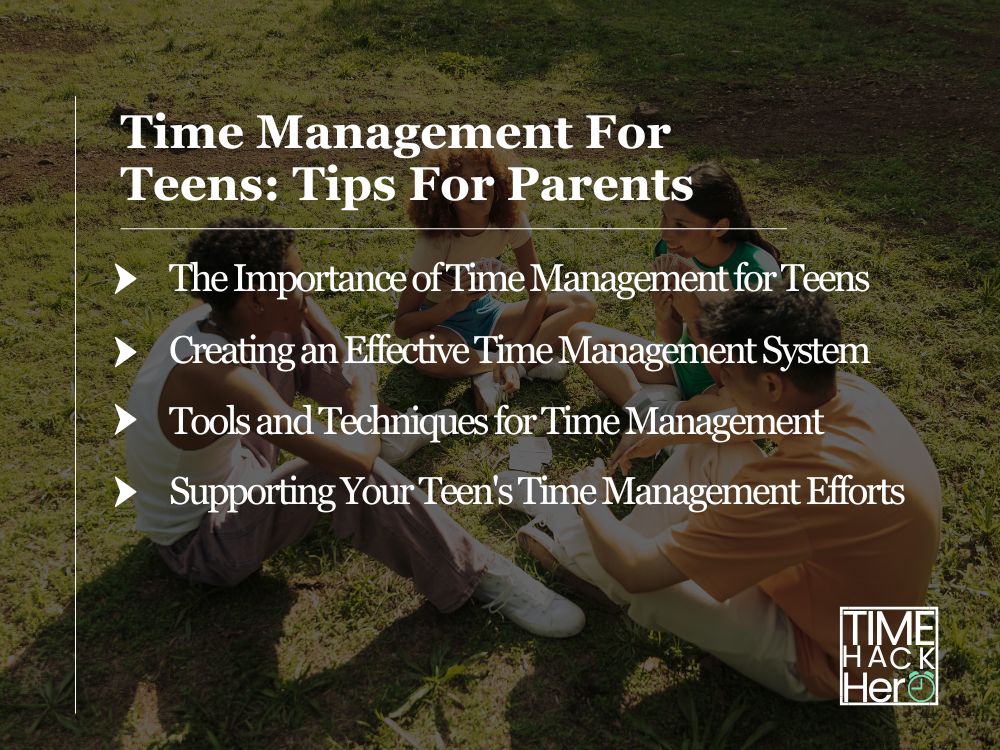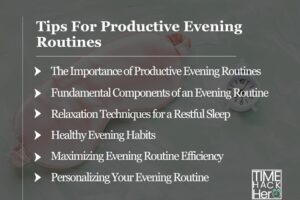Navigating the teenage years can be a challenging time for both adolescents and their parents, but teaching effective time management skills empowers teens to develop better organizational habits and take responsibility for their academic, extracurricular, and personal schedules. As they grow and transition to adulthood, these skills become crucial tools for success in both their education and future careers.
Parents play an essential role in guiding teenagers toward time management mastery. By offering practical techniques and support, teens can begin to adopt habits that enable them to balance their daily tasks, manage stress, and focus on their priorities. In the following article, we will explore effective tips to help parents teach their teenagers essential time management skills—without nagging. Stay tuned to learn how to encourage routines, instill awareness of time, and promote organizational strategies that work for your family.
Table of Contents
The Importance of Time Management for Teens
Benefits of Time Management
Teaching time management skills to teenagers is crucial, as it helps them maintain a healthy balance between school work, extracurricular activities, and personal life. Focusing on time management gives teens the ability to prioritize tasks and avoid unnecessary stress. Effective time management helps adolescents:
- Improve academic performance.
- Increase productivity.
- Enhance decision-making skills.
- Minimize distractions.
Dealing with Procrastination
Adolescents often struggle with procrastination, which hinders their ability to manage time effectively. Parents can help their teens overcome procrastination by using the following strategies:
- Encourage setting specific goals and breaking them down into smaller tasks.
- Promote healthy routines by establishing a regular study schedule.
- Reinforce the concept of prioritizing tasks based on importance and urgency.
- Be supportive and understanding, avoiding nagging or pressuring the teen.
Handling Academic Pressure and Anxiety
Teenagers face substantial academic pressure during their time in school, which can lead to significant anxiety. Proper time management skills can alleviate that stress, allowing teens to stay focused and perform their best. Here are some time management tips for teens dealing with academic pressure:
- Identify the causes of stress and find ways to manage it.
- Develop a daily schedule to allocate time for assignments, studying, and extracurricular activities.
- Use breaks wisely by engaging in relaxation practices, such as meditation or taking walks.
- Encourage teens to seek assistance from teachers, counselors, or peers when facing academic challenges.
To help teens thrive both academically and emotionally, parents should emphasize the importance of time management to counter feelings of overwhelm, distraction, and stress. With effective time management strategies, teens can confidently navigate their adolescent years and prepare for a successful future.
Creating an Effective Time Management System
Establishing Priorities
Teach your teen to prioritize their tasks by importance and urgency. Create a table, using columns for tasks, deadlines, and priorities, to visually organize their responsibilities. Emphasize the importance of focusing on high-priority tasks first and breaking down larger projects into smaller, manageable steps.
Setting Goals and Deadlines
Encourage your teen to set goals for both short-term and long-term activities. Develop a system for tracking progress and deadlines, which can be achieved by using calendars, planners, or digital time management tools. Provide guidance and support in setting realistic, achievable goals, and stress the significance of dedication and consistency in goal setting.
Organizing Routines and Schedules
Work with your teen to establish a daily routine, including morning and evening rituals. This will help them budget time efficiently and develop consistent habits.
- Morning routine: Streamline morning activities, such as getting dressed and preparing for school, with clear expectations. Use a timer to make the routine a productive game.
- Afternoon/Evening routine: Encourage time for homework, extracurricular activities, and downtime during the after-school hours. Allocate specific time slots for each task to maintain organization and productivity.
- Bedtime routine: Help your teen maintain a healthy sleep schedule by calming down before bedtime; this may include reading or taking a warm bath.
Offer guidance in balancing tasks and utilizing tools, such as to-do lists, digital calendars, and phone alarms, to stay organized and avoid multitasking pitfalls. By developing an organized, well-planned schedule, teens can improve their executive functioning skills and boost productivity.
Tools and Techniques for Time Management
Applying the Pomodoro Technique
The Pomodoro Technique is a time management method that helps teens break tasks into smaller, more manageable intervals. By working in focused 25-minute segments called “Pomodoros,” followed by a short break, this technique helps to maintain focus and reduce procrastination. Encourage your teen to use a timer or a Pomodoro app to track their Pomodoros for schoolwork, chores, and any other tasks they need to complete.
Using Timers and Planners
Timers and planners can be useful tools to help your teen stay organized and manage their time effectively. Planners, whether physical or digital, allow them to create a schedule, set deadlines, and allocate time for homework, social events, and extracurricular activities. They can also include checklists for organizing daily tasks and meal planning.
Some tips for using timers and planners effectively include:
- Encourage your teen to create daily, weekly, and monthly lists of tasks
- Use timers to set specific periods for focused work, like the Pomodoro Technique
- Prioritize tasks to ensure important deadlines are met
- Account for necessary breaks and leisure time
Implementing the Eisenhower Matrix
The Eisenhower Matrix is a time management tool that helps prioritize tasks based on their importance and urgency. It can be especially useful for teens struggling with distractions from social media and other digital platforms. To create an Eisenhower Matrix, divide a piece of paper or digital planner into four quadrants:
- Urgent and important: High-priority tasks that need immediate attention, like deadlines and emergencies
- Important, but not urgent: Tasks that contribute to long-term goals, such as studying for exams or working on projects
- Urgent, but not important: Tasks that require prompt action but may not contribute significantly to long-term objectives, like responding to emails or text messages
- Neither urgent nor important: Low-priority tasks, like scrolling through social media or watching TV
Teach your teen to categorize their to-do list items within this matrix and allocate their time accordingly. By doing so, they will learn to prioritize tasks more effectively and improve their overall time management performance.
Supporting Your Teen’s Time Management Efforts
Encouraging Balance Between School, Play, and Downtime
Supporting your teen’s time management efforts involves encouraging them to strike a balance between school, play, and downtime. Help them prioritize their academic commitments while still allowing time for sports, friends, and leisure activities. Encourage your teenager to develop routines that allocate time for homework, extracurriculars, and relaxation. Help them set goals and timelines to break down tasks into manageable steps.
Anxiety plays a significant role in time management issues for teens. As a parent, be supportive and empathetic towards their struggles, while providing guidance and tools, like timers, to help them keep track of time. Minimize unnecessary stressors, and create a healthy home environment that promotes work-life balance.
Resolving Conflicts and Delegating Responsibilities
Teens may face conflicts between their various commitments, which could hinder their time management skills. Teach your teens to delegate responsibilities, whether related to chores, school projects, or any other commitments. Encourage open communication and negotiation with family members, friends, and teachers in order to resolve conflicts and distribute tasks fairly.
It’s essential not to nag your teen about their responsibilities, as it will reduce their sense of accountability and can affect their performance. Instead, teach them to set their expectations and follow through with the consequences when necessary.
Rewarding Progress and Celebrating Success
Recognizing and celebrating your teen’s achievements in time management can significantly impact their motivation and self-esteem. This helps them foster a positive attitude towards school, chores, and extracurricular activities.
- Grades: Commend improvements in their grades, showing them that good time management correlates to better academic success.
- Sports: Whether your teen is part of a high school sports team or enjoys recreational activities, praise their dedication to balancing sports with other responsibilities.
- STEM: Encourage their engagement and progress in STEM fields, as these can lead to rewarding academic and professional opportunities.
- Chores: Acknowledge their diligence in carrying out chores in a timely manner, helping maintain a clean and organized household.
- Commitments: Praise your teens for keeping their commitments and managing their time effectively, demonstrating responsibility and growth.
By supporting your teen’s time management efforts, you’ll aid their development into responsible adults, better equipped to juggle the demands of life.









